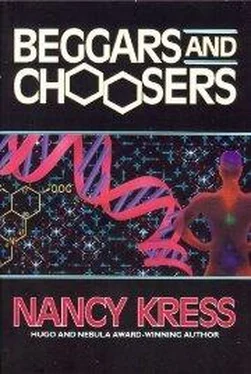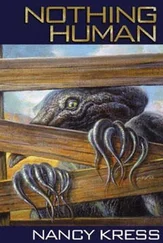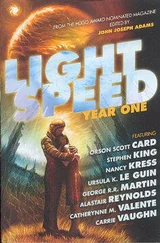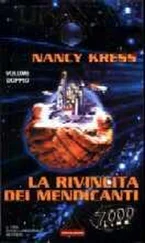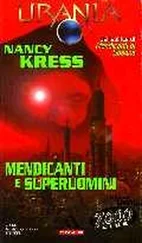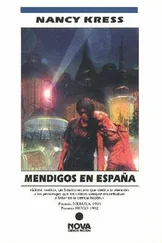“All right, Diana,” Kenneth Emile Koehler said: a bad beginning. I’d been reduced to a first name. Like a ’bot. “Tell us what happened.”
“Everything?”
“From the beginning.”
The recorders were on. Drew Arlen had undoubtedly spilled his brain cells already. And I myself could think of no reason not to tell the truth: Something bioengineered had been injected into my veins. More in the syringe —
But I didn’t want to start there. I felt instead an overwhelming desire to begin at the beginning, with Stephanie Brunell and her illegal genemod pink poodle hurtling itself over my terrace railing. I needed to tell it all, every last action and decision and intellectual argument that had brought me from disgust at illegal bioengi-neering to championing it. I wanted to explain clearly to myself as well as to these men exactly what I had done, and why, and what it meant, because that was the only way I would fully understand it myself.
That was the moment I realized the GSEA had already gotten a truth drug into me. Which was, of course, a completely illegal violation of the Fifth Amendment, a fact too insignificant to even comment on. I didn’t comment on it. Instead I gazed at Koehler and Kowalski and the others who had suddenly appeared and then, wrapped in the glow of absolute truth and in the tender and selfless desire to share it, I talked on and on and on.
DREW ARLEN: WASHINGTON
There were human guards, robot guards, guard shields. But it was the human guards I noticed. Techs, mostly, although at least one was donkey. I noticed them because there were so many. Miranda had more human guards than the entire population of Huevos Verdes, even including the Sleepless hangers-on like Kevin Baker’s grandchildren. She awaited her trial in a different prison from her grandmother, whose treason conviction was ancient history now. Jennifer probably had fewer guards.
“Put your eye directly up to the ’scope, sir,” one of them said. He wore the drab blue prison uniform, cut like jacks but not jacks. I let my retina be scanned. Huevos Verdes had passed this level of identification ten years ago.
“You, too, ma’am.”
Carmela Clemente-Rice stepped closer to the scope. When she stepped back, I felt her hand on my shoulder, cool and reassuring. I felt her in my mind as a series of perfectly balanced interlocking ovals.
I felt the prison as hot blue confusion. Mine.
“This way, please. Watch the steps, sir.”
They evidently didn’t see too many powerchairs here. Inanely, I wondered why. My chair skimmed down the steps.
The warden’s office showed no signs of security or surveillance, which meant there was plenty of both. It was a large room, furnished in the currently popular donkey style, simple straight-lined tables of teak or rosewood combined with some fancy antique chairs with cloth seats and carved arms. I didn’t know what period they were from.
Miranda would have known.
The warden didn’t rise as Carmela and I were shown in. He was donkey to his blond hair roots. Tall, blue-eyed, heavily muscled, a genemod re-creation of a Viking chief by parents with more money than imagination. He spoke directly to Carmela, ignoring me.
“I’m afraid, Dr. Clemente-Rice, that you are unable to see the prisoner after all.”
Carmela’s voice remained serene, with steel. “You’re mistaken, Mr. Castner. Mr. Arlen and I have clearance from the Attorney General herself to see Ms. Sharifi. You’ve received both terminal and hard copy notification. And I have copies of the paperwork with me.”
“I already received this notification from Justice, doctor.”
Carmela’s expression didn’t change. She waited. The warden leaned back in his antique chair, hands laced behind his head, eyes hostile and amused. He waited, too.
Carmela was better at it.
Finally he repeated, “Neither of you can see the prisoner, despite what Justice says.”
Carmela said nothing.
Slowly his amused look vanished. She wasn’t going to either ask or beg. “You can’t see the prisoner because the prisoner doesn’t choose to see you .”
I blurted, despite myself, “At all?”
“At all, Mr. Arlen. She refuses to see either of you.” He leaned back in his chair even farther, unlacing his hands, his blue eyes small in his handsome face.
Maybe I should have expected it. I had not. I laid my hands, palms flat, on his desk.
“Tell her … tell her just that I … tell her…”
“Drew,” Carmela said softly.
I pulled myself together. I hated that the smirking bastard had seen me stammer. Supercilious donkey prick … In that moment I hated him as much as I had hated Jimmy Hubbley, as much as I had hated Peg, that poor ignorant hopeless slob pathetically trying to measure up to Jimmy Hubbley… / can’t help it that I know more and think better than you do, Drew! I can’t help what I am !
I turned the powerchair abruptly and moved toward the door.
After a moment I felt Carmela follow me. Warden Castner’s voice stopped us both.
“Ms. Sharifi did leave a package for you, Mr. Arlen.”
A package. A letter. A chance to write back, to explain to her what I’d done and why I’d done it.
I didn’t want to open the package in front of Castner. But I might need to make arrangements to answer her letter, now, here, and the letter might have some clue to that… It had taken Carmela three weeks to get us this far. A direct favor from the Attorney General. Besides, Castner had undoubtedly already read whatever Miranda had to say. Hell, entire computer-expert security teams had undoubtedly analyzed her words for code, for hidden nanotech, for symbolic meaning. I turned my back to Castner and ripped open the slightly padded envelope.
What if she’d written words too hard for me to read—
But there were no words. Only the ring I’d given her twelve years ago, a slim gold band set with rubies. I stared at it until the ring blurred and only its image filled my empty mind.
“Is there an answer?” Castner said, his voice smooth. He’d scented blood.
“No,” I said. “No answer.” I went on looking at the ring.
You said you loved me!
Not any more.
Carmela had her back to me, giving me the illusion of privacy. Castner stared, smiling faintly.
I put the ring in my pocket. We left the federal prison. Now there were no shapes in my mind, nothing. The dark lattice, that had dissolved in Jimmy Hubbley’s underground bunker to show me my own hemmed-in isolation, had never reappeared. I was no longer sealed in by Huevos Verdes. But Miranda was gone. Leisha was gone. Carmela was there, but I didn’t feel her in my mind, didn’t even really see her.
I was alone.
We went back through the security system and out of the prison, into the cold bright Washington sunlight.
DIANA COVINGTON: ALBANY
I blinked and shut my eyes against the glare of a wall that seemed excessively white. For a moment I couldn’t remember where I was, or who I was. This information returned. I sat up, too quickly. Blood rushed from my head and the room swirled.
“Are you all right?”
A pleasant-faced, middle-aged woman, with a thick body and deep lines from nose to mouth. Minimally genemod, if at all, but not a Liver. She wore a security uniform. She was armed.
I said, “What day is it?”
“December tenth. You’ve been here thirty-four days.” She spoke to the wall. “Dr. Hewitt, Ms. Covington is back.”
Back . Where had I been? Never mind, I knew. I sat on a white hospital bed in a white hospital room thick with medical and surveillance equipment. Under the disposable white gown my arms and legs and abdomen were covered with small clear globs of blood-clotter. Somebody had been taking many many samples.
Читать дальше
